For those of you who have not used hotel comparison site Trivago before, it promises to compare major hotel booking platforms (Hotels.com, Booking.com, Expedia.com, etc.) to show the best deal for each room type at each property. The idea is that you can be assured you are receiving the best price for the room you are booking, without having to check multiple hotel booking platforms, because it will do it for you.
I usually use Hotels.com to book independent hotels because of their fantastic 10% off Reward Night program which I have written about before, but will often cross-reference Trivago to check that I do indeed have the best price for the particular room and property I’m choosing. If Trivago does show the same room for more than 10% less than Hotels.com is showing, I will usually book the Trivago option.
Trivago is owned by Expedia, and advertises heavily around the world. So even if you have not used the site, you may have at least heard of it.
Like all independent hotel booking websites, they receive a commission from the hotels they list, for each room booked through their platform — this is how they make their money (there is no booking or payment fee charge over and above the room price).
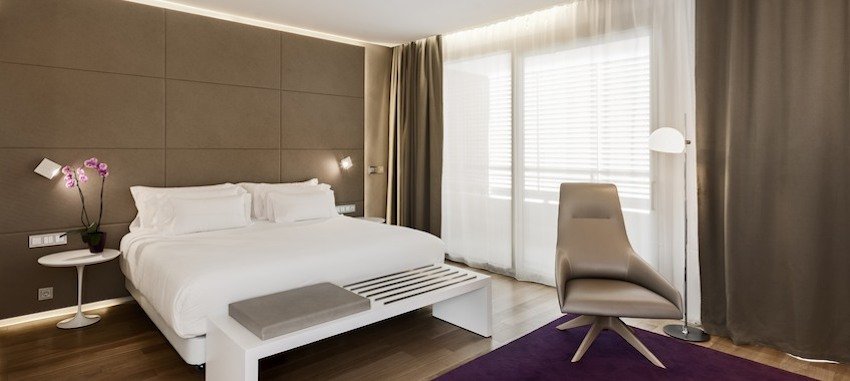
Australian Competition and Consumer Commission
The Australian Competition and Consumer Commission is an independent authority of the Australian Government, that is designed to protect consumers against unfair business practices, namely breaches of the Consumer Act 2010 (which was previously known as the Trade Practices Act 1974). You may be familiar with the phrase ‘misleading and deceptive conduct,’ which is probably the most famous wording from this act — retailers in Australia must not mislead or deceive consumers.
I did an entire subject at law school on Consumer Law many years ago.
Where the ACCC believes a retailer has breached the Consumer Act 2010 (i.e. where it may have engaged in ‘misleading and deceptive conduct’), it has the power to bring a case against a retailer in the Australian Federal Court. If successful, the Federal Court may penalise the offending retailer with penalties of up to AUD$10 million.
The ACCC successfully sued Australian hotel group Meriton for misleading consumers by manipulating TripAdvisor reviews, which I wrote about here.
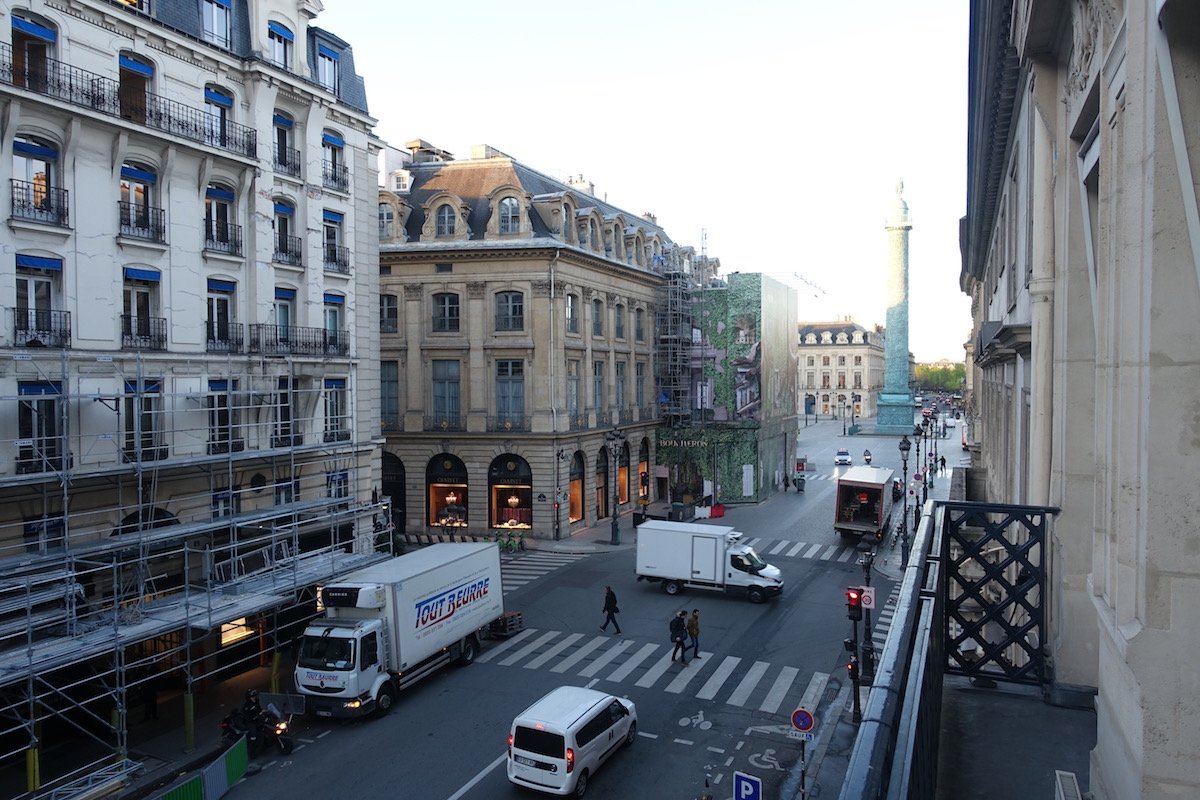
ACCC v Trivago
The ACCC has instigated proceedings in the Federal Court against Trivago, claiming the television advertisements they ran over 400,000 times from 2013 to April of 2018, have mislead consumers in the following ways:
- Trivago represented itself as an impartial aggregation and comparison tool, that promoted the cheapest publicly available price for a particular hotel room.
- When customers visited the Trivago website, a particular price and deal would be highlighted by Trivago to the customer. The customer would believe this was the lowest available price, however it was in fact the deal that paid the highest amount of commission to Trivago.
- The savings shown on the Trivago website were not a genuine representation of the actual discount for that room, but rather showed a higher priced standard room, which was naturally more expensive than the cheapest room at the cheapest price.
Let me show you a dummy booking on Trivago to see if this is still happening.
Let’s say I’m searching for a room at the Hilton Paris Opera next year. Here are the Trivago results.
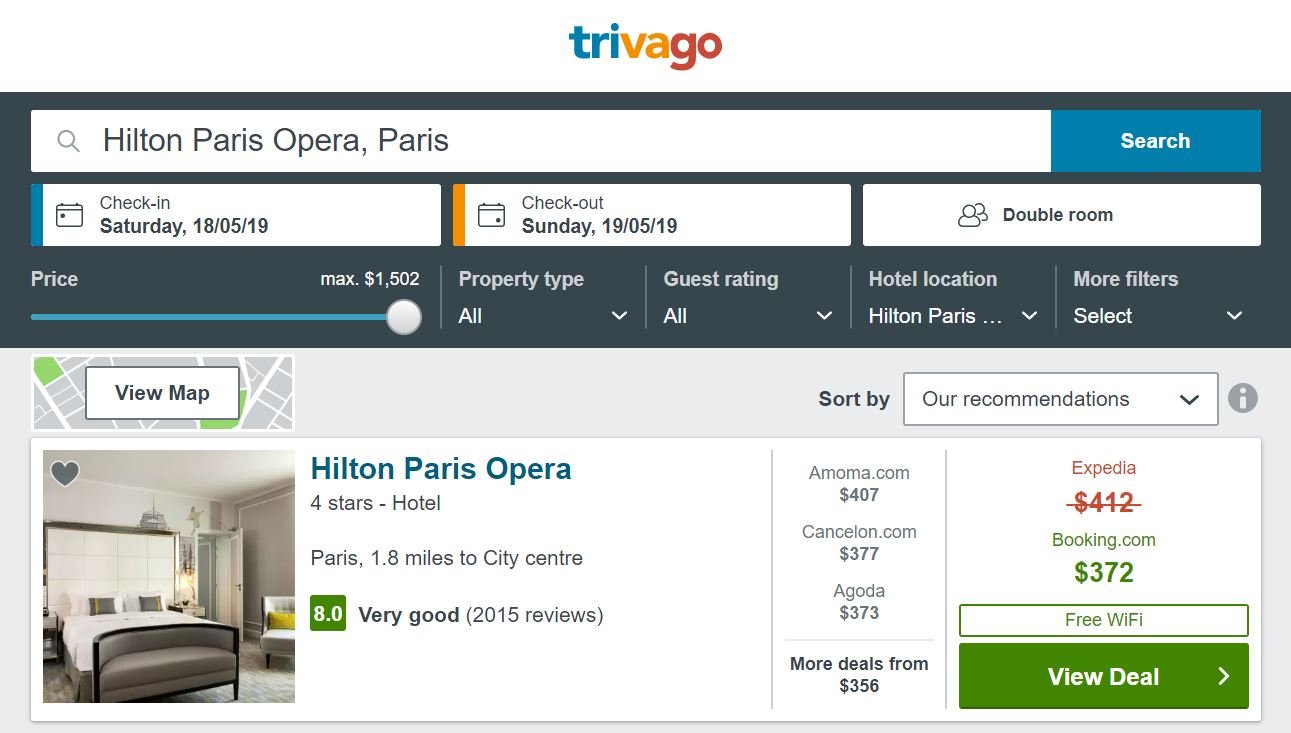
Now you can see from the results that the highlighted best deal/price is from Booking.com ($372). This suggests that it is $40 cheaper for the same room than the struck-out Expedia price of $412.
However you can see there are ‘More deals from $356,’ which is cheaper than the highlighted/suggested Booking.com price.
When comparing what type of room and product is offered by each of the three prices ($356, $372, and $412) I can see the following:
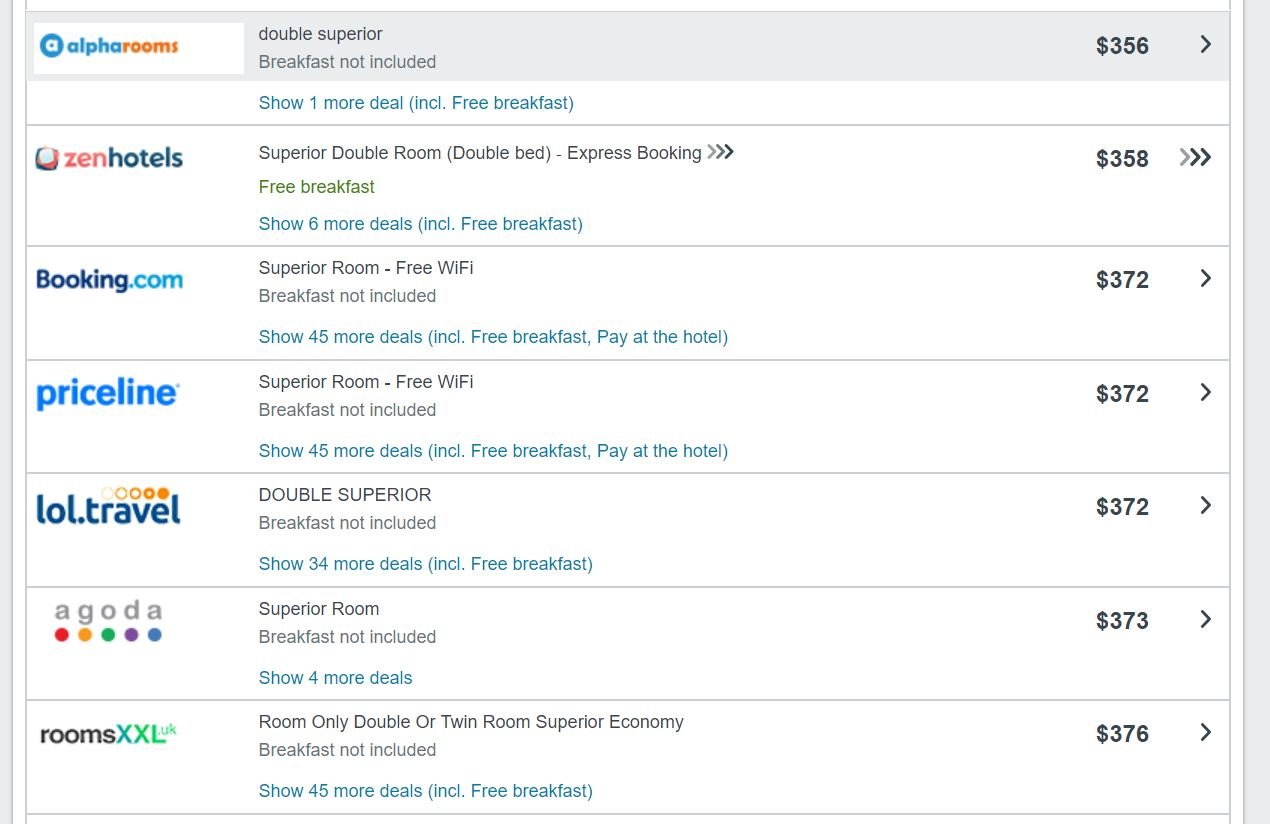
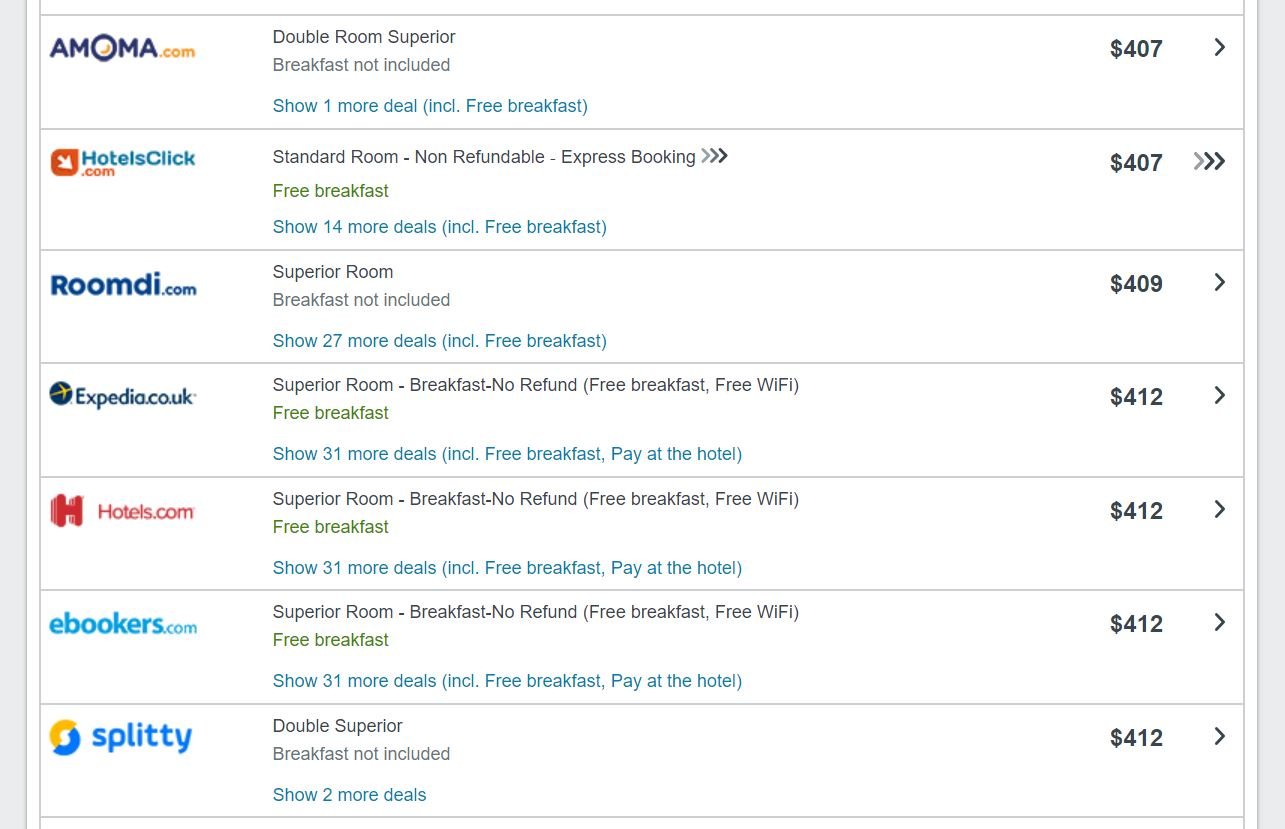
The cheapest Alpha Rooms option shows the same room type as the more expensive promoted Booking.com option.
So Trivago is not promoting the cheapest price for a Superior Room.
While Alpha Rooms and Booking.com may have slightly different cancellation policies (i.e. one may be more generous and therefore more valuable than the other) for the same Superior Room, Trivago is indeed promoting a more expensive price for the same room, even though they are supposed to promote the best price.
And what about the most expensive price for this room, the $412 option listed by Expedia?
Well in fairness it does include breakfast which would be worth the extra $40 (for two people), but it’s not showing a like for like, as it’s suggesting by booking with the promoted Booking.com option you will save $40 on the exact same room and inclusions as Expedia is charging for, when the Expedia option includes breakfast and the Booking.com option doesn’t.
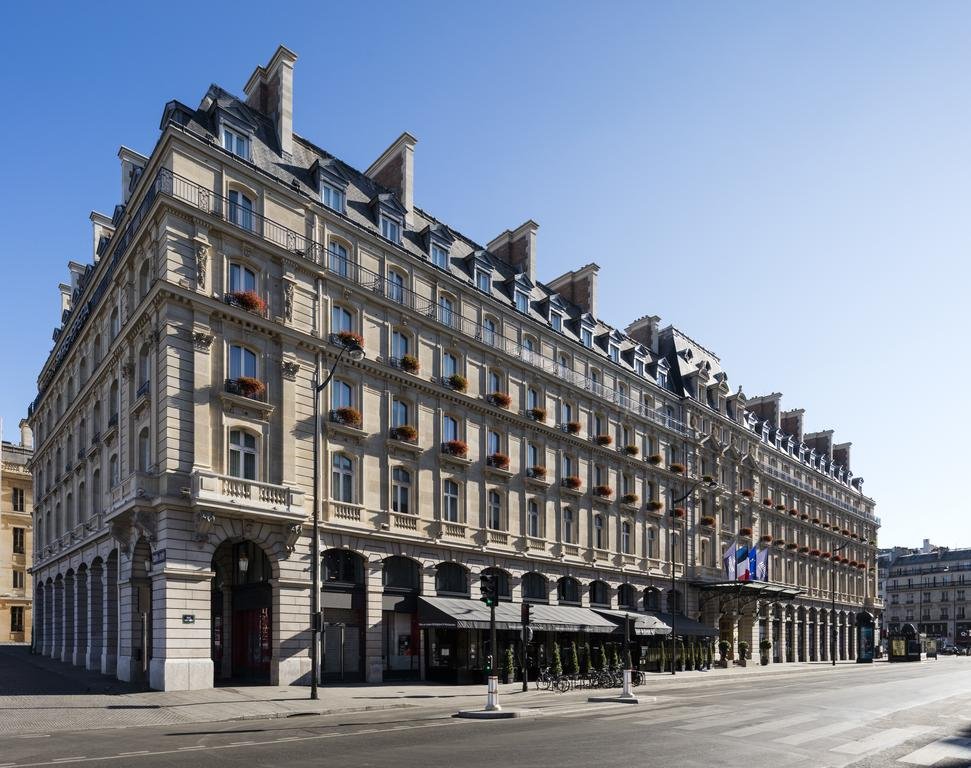
Bottom line
I have occasionally booked with Trivago before, and must admit I was unaware of this tactic. While the example above shows a promoted price that is only slightly more expensive than the cheapest available price, it does indeed mislead consumers.
I’ll be very interested to see the outcome of the Federal Court case, and if Trivago is found guilty (and it appears they are still engaging in some of these practices), they can expect a severe fine just as Meriton did.
Have you booked with Trivago before?





Would Skyscanner be next to be scrutinized??
I always felt Trivago didn't make a fair job comparing prices.
Most of times they compare apples and bananas, like the breakfast example you showed, or fares without taxes and others with all included.
I still use Trivago, most times to see which sites have the hotels availability and overall score of the accommodation. But I visit every site to check may options and see if they are really the best.
Thanks for responding, James. I've read that one, when you published it. I was more curious on comparing the straight-forward Hotels.com program with the complicated major chains' reward programs. When do each offer a better return. A set of rules of thumb would be extremely useful.
Does anyone have a matrix of who owns each of the search companies like Trivago. It is noticeable that more and more of the search input screens are identical.....and this ought to be the place where you can optionally add value by asking relevant questions relating to room type, breakfast, taxes and the dreaded resort fees ?
@the Nice Paul
Funny,recently I did some online shopping/browsing at a well-known British retailer. A message appeared: this item does not ship to Iran, Syria, Cuba, Sudan.
Seems that a few have taken Trump at his word in respect of the threats to be blocked from the US market. I passed on the purchase and shopped elsewhere.
The comment about sites just being skins for something else is well made. Expedia.co.uk for example doesn’t accept that there is an airport in somewhere called Havana (Cuba).
Turns out it’s just a US company *pretending* to be a British one, but buckling under to the US government’s ludicrous boycott.
I agree with Mike, I never trust travel booking sites, whether airfare, hotels, or rental cars, to provide impartial objective results. They do sometimes, but I usually only confirm that after do my own leg work by visiting different sites myself. I'm not as concerned for the low end stuff, but when looking for deals on high end, the extra legwork can yield significant savings, and why pay more for the exact same thing if...
I agree with Mike, I never trust travel booking sites, whether airfare, hotels, or rental cars, to provide impartial objective results. They do sometimes, but I usually only confirm that after do my own leg work by visiting different sites myself. I'm not as concerned for the low end stuff, but when looking for deals on high end, the extra legwork can yield significant savings, and why pay more for the exact same thing if you can avoid it? We all look out for our own best interests so it makes sense others will be doing the same. It's up to us to do due diligence to ensure we are getting the best deals.
Thanks for that, James. With regards to Hotel.com attractive scheme (and generous cashback in OZ), can you comment (or even better, dedicate a post) on a comparison between their scheme and booking through the non-independent hotels directly (presumably to accumulate their points), when the prices are equivalent, or as more often happens - cheaper with Hotels.com.
@ AI - way ahead of you : )
https://onemileatatime.com/hotels-com-rewards/
I'm a little surprised that people are surprised. It is one of the first things I noticed about Trivago.
THE OTHER, more important thing that I have found is that Trivago misrepresents some of the sites (including ones that belong to the Expedia group).
I have found this happens the most with hotels.com where it is pretty common to find room rates $20-30 below the price shown on Trivago.
I use it...
I'm a little surprised that people are surprised. It is one of the first things I noticed about Trivago.
THE OTHER, more important thing that I have found is that Trivago misrepresents some of the sites (including ones that belong to the Expedia group).
I have found this happens the most with hotels.com where it is pretty common to find room rates $20-30 below the price shown on Trivago.
I use it mostly to find very low rates on obscure-ish sites. It doesn't happen every time, but I have been able to secure very low rates on sites like amoma or zen, which I usually do not visit.
To those who choose to comment on the James' choice of what to bold- all I would say is "really?"
To James - great content. I really like your angle. It complements Lucky's very well. I hope you could one day help us down-underers identify ways to get the same level of point value one can get in the US.
@Imperator. I fell off my chair with your comment. I couldn't agree more.
I have never booked a hotel through Trivago, but I have used it many times to scope out and compare prices. However, I believe the SORT BY PRICE option still exists on Trivago, and I use it every time. I am still probably getting hoodwinked, but at least I only peruse the least expensive and then compare online sites, especially the hotel's own website, which in my experience in about 95% of the cases, offers...
I have never booked a hotel through Trivago, but I have used it many times to scope out and compare prices. However, I believe the SORT BY PRICE option still exists on Trivago, and I use it every time. I am still probably getting hoodwinked, but at least I only peruse the least expensive and then compare online sites, especially the hotel's own website, which in my experience in about 95% of the cases, offers a lower rate than any of the aggregators or consolidators.
Case in point: just booked hotel in Auckland, a pretty expensive destination. What was offered by the online sites was about $135 USD a night...what I got from the hotel's own website was $106 USD, and this was at a serviced apartment, brand new, pretty luxurious.
Thanks, James, for the reminder that as always and everywhere...LET THE BUYER BEWARE.
Everything is dodgy in Australia at the moment....Trivago included!!
I’ve used these many times in Australia and have always checked if any “ lower “ price is available further down. To be honest I have also seen this in the Hilton site when you scroll down there is often a cheaper room deal. Gotta keep scrolling...... ha ha
It is refreshing to read about a country that has consumer protection laws in place and then uses its enforcement powers to make bad actors comply with the law.
The USA used to have something like that until Donald Trump and his people-hating goon squad took control of the government via conspiring with Russia.
FUCKK DONNALD TRUMP!P!!!!!!!!!!!!11!!!!!!
I always thought these type of booking engines were for suckers......
I always thought Trivago, given the appearance of its American television spokesman, was a website to find homeless shelters.
Most savvy travellers know not to trust any single source but to use a couple of different tools / approaches and cross check if you are getting a good deal. I have used Trivalgo a couple of times but have always felt their approach is dishonest. Glad someone is trying to hold them accountable.
Sue them into oblivion.
I always assumed that Ben had an Inigo Montoya-style nemesis who was an editor and that was the reason for the frequent and unnecessary misuse of bold and italics on this blog. Imagine the suffering inflicted on this nemesis with every post! Every line is like a rapier inflicting a small wound...
As for Trivago, my recollection of their advertising is that they claim to help you find the best hotel for your preferences. The...
I always assumed that Ben had an Inigo Montoya-style nemesis who was an editor and that was the reason for the frequent and unnecessary misuse of bold and italics on this blog. Imagine the suffering inflicted on this nemesis with every post! Every line is like a rapier inflicting a small wound...
As for Trivago, my recollection of their advertising is that they claim to help you find the best hotel for your preferences. The best deal/price is hard to say given that booking through OTAs is already a gamble that often leads to problems. I probably wouldn’t book AlphaRooms to save $20.
I don't see how this is deceptive as the sort is "our recommendations" and displayed just above the prices where it's clearly visible.
They also aren't hiding that there are lower prices as they are displayed with all the others.
You could complain about the same thing with end caps at stores. Those are frequently not the cheapest option compared to what's in the aisle. It's just the store's recommended item.
Why are people moaning about the bold print all of a sudden? This site has always put random sentences in bold for no apparent reason - especially James. Presumably it's just to break up the text a bit.
@ Callum - bold-ing is intentionally used to both control the speed at which the reader reads, and draw to their attention those parts the writer thinks are important.
Commas are similarly used to control the speed the readers reads.
Blogging and writing are not the same things.
Omg. This article is so rich. You went to law school?
Also this reminds me of some other website:
"When customers visited the Trivago website, a particular price and deal would be highlighted by Trivago to the customer. The customer would believe this was the lowest available price, however it was in fact the deal that paid the highest amount of commission to Trivago."
Finally be thankful Australia is not overrun by Republican scumbags....
Omg. This article is so rich. You went to law school?
Also this reminds me of some other website:
"When customers visited the Trivago website, a particular price and deal would be highlighted by Trivago to the customer. The customer would believe this was the lowest available price, however it was in fact the deal that paid the highest amount of commission to Trivago."
Finally be thankful Australia is not overrun by Republican scumbags. The commission would have brought cases only against the prime minister's "enemies".
@ Debit - I spent six months devoting more time to misleading and deceptive conduct than you do to obscure comments!
I stopped using Trivago around two years ago for this exact reason.
Yes, used Trivago to compare (in addition to my own comparison of high-profile sites, no stone left unturned) and have noticed that prominent price is not the cheapest. And once I drilled into cheaper prices under "more deals", I saw apples and oranges and occasional mango, with no option to filter it out (breakfast options, spa credits, free transfers, different room types, suites, to name the few).
What riles me even more (and is...
Yes, used Trivago to compare (in addition to my own comparison of high-profile sites, no stone left unturned) and have noticed that prominent price is not the cheapest. And once I drilled into cheaper prices under "more deals", I saw apples and oranges and occasional mango, with no option to filter it out (breakfast options, spa credits, free transfers, different room types, suites, to name the few).
What riles me even more (and is rarely mentioned anywhere) most of the sites displayed on comparison sites are just thin skins on Expedia or booking.com. Yes, the price you are looking might be best among 20 sites compared, but how about 18 of those sites are truly dipping into the same database and owned by same company? All the times I drilled down, the price difference could be tracked down whether the site includes VAT and/or hotel fee and/or tourist tax and/or... And once that is stripped away, I was floored (maybe I should not be surprised, in time of internet-enforced market efficiency) that ALL prices are actually equal to a penny, with few more expensive outliers
I don't even think its that bad and I will continue to use Trivago as its great. They are still showing other prices people just need to look for it.
Same comment on weird bolding Re:”Trivago is owned by Expedia, and advertises heavily around the world. So even if you have not used the site, you may have at least heard of it.”
I reread it several times as I was trying to find the important point it was making. You’re trying to convince me I care because I should have heard of it?
@ Alexander, @VT- I found it interesting that they are owned by one of the sites they list as I thought if they would promote anyone unfairly it would be their parent company.
I know most savvy points collectors book accommodation directly with the hotel provider to ensure they are given their elite benefits so expected many people to see the headline and immediately think 'whats Trivago?'. But they may have seen an ad...
@ Alexander, @VT- I found it interesting that they are owned by one of the sites they list as I thought if they would promote anyone unfairly it would be their parent company.
I know most savvy points collectors book accommodation directly with the hotel provider to ensure they are given their elite benefits so expected many people to see the headline and immediately think 'whats Trivago?'. But they may have seen an ad for them on TV, even if they're never visited the site.
If my decision to bold one sentence I thought would be relevant in an article, offends you that much I'm happy to de-bold it ; P
Sly, deceitful and creepy. Fines are useless , eg the EU’s mega fines against various US companies; better to throw the bastards in jail for a couple of years, 5-10 better still. This reads like a conspiracy to defraud.
My biggest problem with Trivago is the fact they are comparing over 200 plus sites....besides the known OTA like Booking, Expedia, Hotels.com etc. I have never heard anything about those other OTA like AlphaRoom....how can I know that they can be trusted? If anything goes wrong...who is responsible for any malfunctioning that shouldn't be an issue when booking with the big OTA?
Finbes of up to AUD10 million sound impressive, but multinationals need to be fined a % of total global turnover before they'll take notice: eg, see the European Union action against Google, which has even caught Trump's attention. Otherwise this is just a marketing expense.
Better remove the bolding as there is nothing especially important to the article said in these lines.
'Trivago is owned by Expedia, and advertises heavily around the world. So even if you have not used the site, you may have at least heard of it.'
Looks like the best deal to me is zenhotels at $358 since it at least includes free breakfast! ;)
There is a fine difference between "best deal" (that's what they are promoting on the website, don't know about the TV ads) and "cheapest deal". And I think during the legal proceedings that difference (and what each phrase means for customers) will play a major role.
I have noticed this tactic on Kayak, Tripadvisor, and other aggregator sites, too. I am not sure, however, if they represent themselves differently.
The truly nefarious part, to me, is that taxes and fees - especially resort fees - are rarely included in the advertised price (one has the option on Kayak to include taxes, but not on Trivago). In Seattle, for example, up to 25% of the room price is added prior to booking...
I have noticed this tactic on Kayak, Tripadvisor, and other aggregator sites, too. I am not sure, however, if they represent themselves differently.
The truly nefarious part, to me, is that taxes and fees - especially resort fees - are rarely included in the advertised price (one has the option on Kayak to include taxes, but not on Trivago). In Seattle, for example, up to 25% of the room price is added prior to booking or purchase.
These advertised rates should be inclusive of ALL taxes and fees. Just like the airlines.